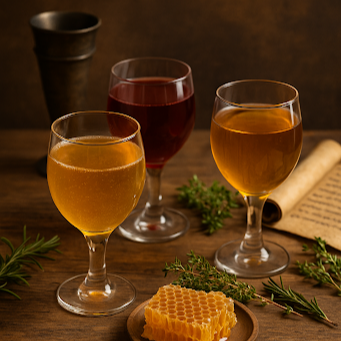Your Cart is Empty
For centuries, mead has been revered not just as a beverage of celebration, but as a potion of vitality. Often referred to as the “nectar of the gods,” mead’s history is steeped in medicinal lore, whispered wisdom, and now, renewed curiosity. In this post, we’ll exploremead as a health tonic, examinemodern mead insights, and separate fact from fiction when it comes todispelling mead myths.
In ancient civilizations, mead was more than a drink—it was believed to possess healing powers. The Greeks, Celts, and Vikings all embraced mead as part of rituals, remedies, and health practices. Honey itself has antimicrobial properties, and when fermented into mead, it was thought to transfer these benefits into a sippable elixir. Folk healers used it to soothe digestion, treat wounds (externally and internally), and even enhance fertility.
While those early beliefs may not all hold up to scientific scrutiny, they hint at mead’s historical importance in wellness and natural medicine.
Today, researchers and health-conscious consumers are revisiting the potential benefits of mead—but with a modern lens. Here are a fewmead nutritional properties andprobiotic properties worth noting:
Raw honey used in traditional meads contains antioxidants, enzymes, and trace minerals.
Some meads, especially those that are bottle-conditioned or unfiltered, may containprobiotic bacteria from wild or controlled fermentation.
Mead can be gluten-free, sulfite-reduced, and relatively low in preservatives, depending on how it’s made.
However, these benefits can vary widely depending on the type of mead, the fermentation process, and the ingredients used. Not all meads retain probiotic cultures, especially those that are pasteurized or mass-produced.
Let’s address some popular misconceptions:
“Mead is good for you because it's natural.”
Not always. “Natural” doesn’t mean “health food.” Mead is still an alcoholic beverage.
“It’s healthier than wine or beer.”
Mead varies in sugar and alcohol content. Some versions can be higher in calories or residual sugars than expected.
“All meads have probiotics.”
False. Only live-fermented, unpasteurized meads may contain probiotics.
“Mead won’t give you a hangover.”
Any alcohol consumed in excess can cause dehydration and hangovers—even mead.
It’s important to enjoy mead responsibly, and not assume health benefits without understanding the context.
Mead’s reputation as a health tonic dates back thousands of years.
Many ancient cultures believed it enhanced digestion, fertility, and vitality.
Raw honey used in mead provides enzymes, minerals, and antioxidants.
Modern mead insights reveal potential benefits when meads are unfiltered or naturally fermented.
Some meads containprobiotic properties, especially if bottle-conditioned.
Mead is gluten-free, making it suitable for people with gluten intolerance.
Not all meads are created equal,sugar and alcohol levels vary widely.
“Mead is healthier than other alcohols” is a myth, moderation is key.
Many commercial meads are pasteurized and do not retain probiotics.
Mead can be part of a well-balanced lifestyle, when consumed mindfully.
The allure of mead is undeniable. From its ancient use as ahealth tonic to the recentmodern mead insights aroundmead nutritional and probiotic properties, it’s clear that honey wine holds a unique place in our history and our glasses.
However,dispelling mead myths is important. Mead is not a miracle cure, and like all alcoholic beverages, it should be enjoyed with intention and care. That said, exploring artisanal, small-batch meads made with real ingredients can offer a more wholesome and flavorful experience.
So raise your glass, not in search of eternal youth, but to savor the heritage of honey, fermentation, and a drink with a story.
Comments will be approved before showing up.
